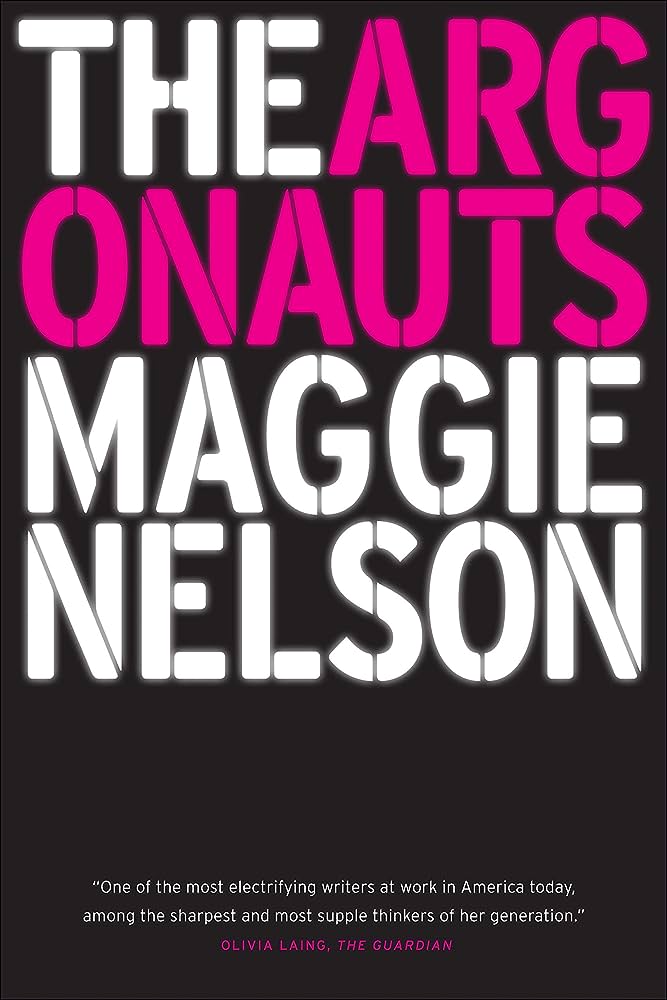At the center of Maggie Nelson’s The Argonauts is a structured confusion. A confusion over things everyone’s considered: their place in life, their past, their future, love, and life itself. And a confusion over specificities: identity and sexuality and gender and motherhood and the philosophy of everything combined.
I read The Argonauts because it was a gift to me from a writing teacher I had at Iowa (IWYS), given to me because of its jarring similarities to one of my short stories (about lesbians and motherhood). I’d heard of Nelson before because of Bluets, a little book of hers featuring essays and stream-of-consciousness prose. I’d never thought to give nonfiction a try, not of any kind. And it wasn’t because I preferred the comfort of fiction, no I like it when my books make me cry, but because I’ve always associated nonfiction writing with something scholarly, something read not for pleasure but for knowledge. Imagine my surprise when I read the first few pages of The Argonauts for the first time and found that this was exactly what I’d been looking for, both in writing and theme.
Nelson weaves together vignettes in her stream-of-consciousness style. They’re about everything and nothing all at once. You could skip around in the book and be just fine. I think that’s the beauty of it, of being able to experience a life in its most significant and insignificant moments. She recalls everything with such vividness you can’t help but feel like you’re right beside her as she writes, peering over her shoulder and into her mind. There’s such a beauty to her confusion, a confusion she lends us to peer into and experience with her because, really, we know nothing either. But she invites us along for the ride anyway.
At its core, her book is about her relationship with both gender-nonconforming partner Harry, and with motherhood through her son, Iggy. Nelson divulges plenty in queer theory, all about gender and identity and what it means to be queer in the world. But at the same time, she opens up about little aspects of their relationship, little things like being lovesick on her friend’s office floor and the house on the hill she and Harry share and the tumultuous wedding they had just before Prop 8 was passed. We are equally thrust into her life as we are into the philosophies she ponders. And all throughout, the language is absolutely stunning. I mean, I’ll admit it, I was confused reading some passages. There were mentions of people I didn’t know, things I have yet to experience, and yet I still read them because it was such a joy to just read them!
Here’s one of my favorite passages:
“One night during our courtship, I came home to find the stump with bolts lying across the welcome mat of my porch. You had left town, and I had been baffled by your departure. But when I ascended my front steps and saw the weapon, shadowy in the twilight, I knew you loved me. It was a talisman of protection–a means of keeping myself safe while you were gone, a tool to fight off the suitors (had there been any). I’ve kept it by my bedside ever since. Not because I think they’re coming for us per se. But because it makes the brutal tender, which I’ve since learned is one of your principal gifts.”
Nelson, page 118
There’s such a persistence she writes with, one that feels like fighting a rushing wave. She knows it’s difficult, it’s tender, and yet she’s irrevocably vulnerable to us. It’s her vulnerability that is most jarring but beautiful at once.
A review I read of this book (a negative one, I always read the negative ones – does that say something about me? maybe.) expressed their dislikes of what Nelson was saying rather than how she said it. And for a book that emphasizes the lack of form and structure, I’d say this just doesn’t apply. The reviewer said they hated how Nelson felt stupid at times, how she (as a real-life person) couldn’t sympathize with the right things or sometimes asked the dumbest questions. But isn’t that life? And it’s a gracious thing that Nelson lent us the time in her head, no matter how stupid or embarrassing or controversial it may have been.
This brings up the question of unlikability and vulnerability. Because to be vulnerable is to be unlikable. You’ll never meet someone who opens up to you and it’s just more kindness hidden underneath. No, it’s always the terrible, the stupid, the ugly. But that’s what I loved so much about The Argonauts. You could feel the hesitance at times, Nelson’s unsureness of whether what she was saying should be said. But she said it all anyway. There’s a beauty in vulnerability, something to love in the rawness, the cruelty.
The Argonauts is at its best when Nelson is most open, not only with us but with herself.
Here’s a link to the book on Amazon so you can experience Nelson’s beautiful writing for yourself.
